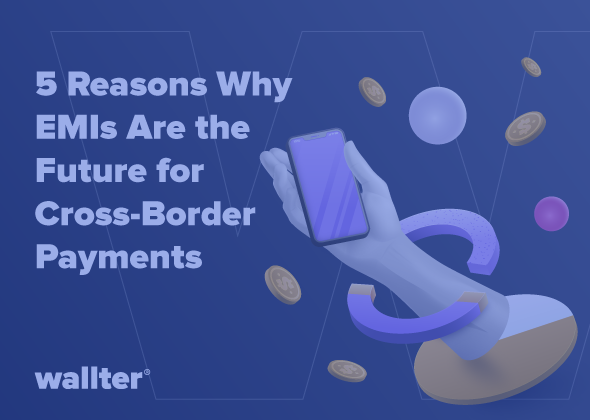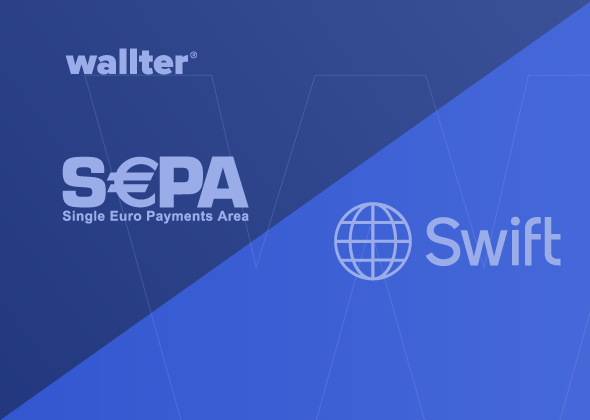Commercial banks are traditionally perceived as the dominant players on the financial market, but that status is regularly challenged by Electronic Money Institutions, colloquially known as EMIs. Digital financial platforms like Wallter provide global payment solutions that have been tailor-made to suit the needs of each client specifically.
Businesses can operate today both with traditional banks, and EMIs, but there is an increasing trend in the number of business clients that prefer E-Money Institutions. This is mostly because EMIs are more inclined to take them than brick-and-mortar banks. The latter fear the high compliance risks these businesses entail and the extended due-diligence procedures they are required to go through at all times.
In this article, we will list the biggest advantages EMIs, such as Wallter, hold over licensed banks.
E-Money Institutions Offer Fully Digital and Remotely Operated Solutions
Digitalisation lies at the core of FinTech and allows clients to have round-the-clock access to their accounts and banking, no matter where they are. IBAN accounts for businesses represent an all-in-one digital platform, thanks to which customers can hold funds in multiple currencies under a single borderless bank account.
A foreign exchange service allows for smooth currency conversion, without any limits to the number of transactions and their size. EMIs offer 24/7 top-of-the-line customer support operated by professional account managers you can contact via a message, email, or phone.
You Can Make Fast Payments with Multiple Payment Options
Through Electronic Money Institutions, clients can rely on a variety of methods for multi-currency payments, which are characterised by flexibility, processing speed, and advantageous and fair fees. Unfortunately, this can’t be said for traditional bank services. Namely, commercial banks mostly conduct payments through credit/debit cards and limited wire transfers. On the other hand, EMI’s strength lies in the incorporation of novel payment options that include electronic currencies and e-wallets.
Client’s Funds are Entirely Safe and Secure
Even though they provide users with cards, accounts, and other bank-like services, EMIs are not banks per se. Still, that doesn’t mean they are not controlled by the central financial authorities and governments in the markets where they do business.
If we take Wallter as an example, we can see that it has been licensed by the Bank of Lithuania, under the Central European Bank, and financial jurisdictions in the UK and Singapore. According to the rules imposed by these institutions, such as the Lithuanian Deposit Guarantee Scheme, all customer funds are held in a separate account at the Central Bank of Lithuania, so client’s funds guaranteed is the policy Wallter adheres to completely.
In fact, Wallter has gone the extra mile with its policy with an additional Safeguarding Bond. Wallter ensures 100% of the customers’ funds and guarantees that their money will be available for withdrawal at all times
What’s more, there have been various cases of banks that did not pay their customers the sums of their entire savings. However, with EMIs, such a turn of events is not possible.

EMIs Are Versed in Compliance and Due-Diligence Procedures
Companies frequently encounter an insurmountable obstacle in the shape of rules and regulations banks are obliged to follow. Luckily, EMIs are inclined to face such challenges head-on since they rely on their teams’ expertise to tackle compliance issues and perform enhanced due diligence procedures effectively.
Some of the parameters that EMIs assess include the business activity, ownership structure, and location of the company. For example, EEA-based companies are going to be ranked as lower-risk enterprises, as opposed to those registered in other places.
Final Thoughts
EMIs (Electronic Money Institutions) have established a permanent foothold in the fintech market, and their number is constantly growing. There are around 500 EMIs operating in Europe. However, not all of them are deserving of your attention and trust.
For the state-of-the-art service, clients should turn to established providers like Wallter. Wallter is licensed by the Bank of Lithuania and is present in over 100 countries worldwide. When it comes to offering services to business ventures, the company uses a know-how method, which guarantees success.
For more details on how to open a borderless corporate bank account, contact Wallter, and get a solution specifically designed just for you.



